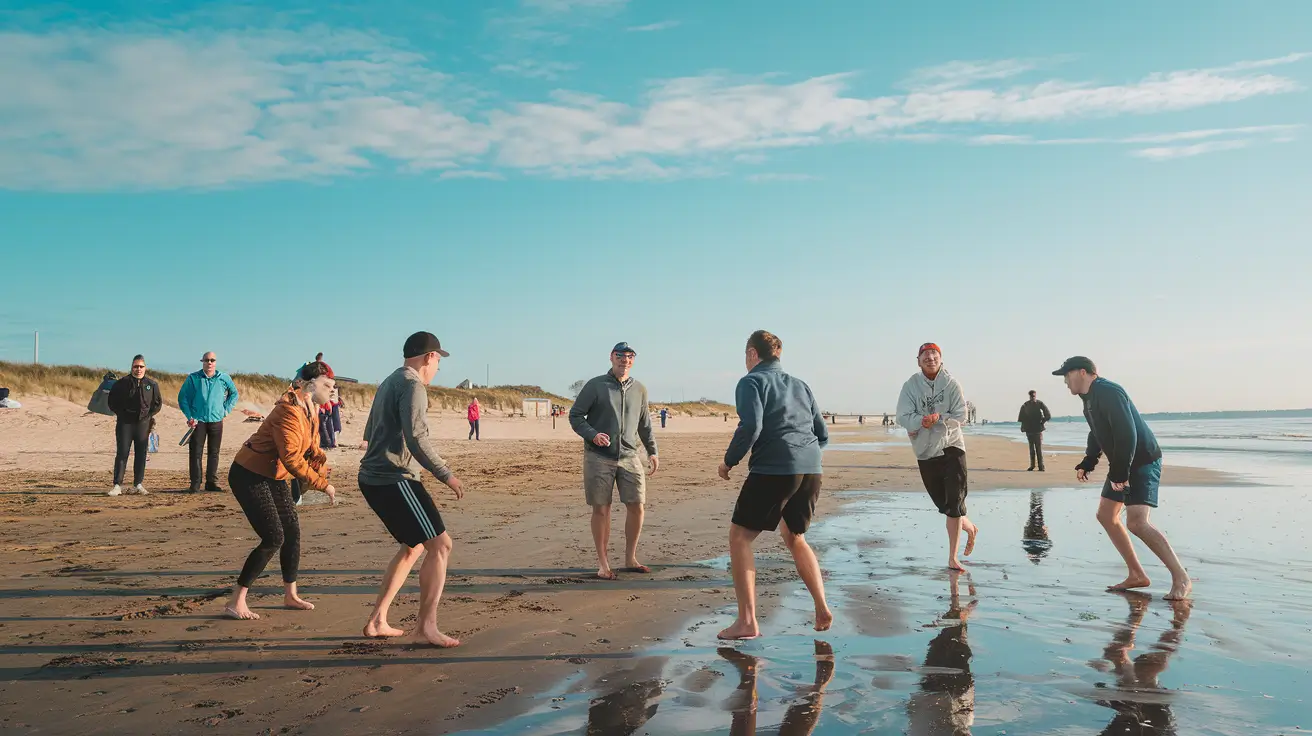Playing a Sport for Travel: 4 Powerful Benefits of Playing a Sport for Travel
Travel and sports are two passions that often intersect in exciting and transformative ways. Playing a sport for travel refers to engaging in sports as a means to explore new destinations, cultures, and experiences. Whether you’re an amateur athlete competing in international tournaments, a fitness enthusiast attending sports camps abroad, or simply playing recreational sports during your travels, this trend offers countless opportunities for adventure, personal growth, and connection.
This article delves into the concept of playing a sport for travel, highlighting its benefits, popular sports for travel, tips for combining sports and travel, and how this approach can enrich your journey.

Table of Contents
- What Does Playing a Sport for Travel Mean?
- Playing a Sport for Travel: Benefits of Playing a Sport for Travel
- Playing a Sport for Travel: Popular Sports for Travel
- Playing a Sport for Travel: How to Plan a Trip Around Playing a Sport
- Playing a Sport for Travel: Challenges of Playing a Sport for Travel
- Playing a Sport for Travel: The Future of Playing a Sport for Travel
- How Playing a Sport Enhances Travel Experiences
- Also Read: How to Travel Europe for 2 Weeks?
- Playing a Sport for Travel: Sports You Can Play Anywhere While Traveling
- Playing a Sport for Travel: Incorporating Sports Travel into Family Vacations
- Playing a Sport for Travel: Sports Training Camps and Retreats
- Sports and Eco-Tourism: A Sustainable Approach
- What Age Should You Start Travel Sports?
- What Are the Pros and Cons of Travel Sports?
- Are Travel Sports Worth It?
- Is a Travel Ball Worth It?
- Why Are Travel Sports Bad?
- What Is Travel Basketball?
- Travel Sports Ruined My Marriage
- Playing a Sport for Travel: Playing a Sport for Travel Insurance and Cost
- Conclusion: Playing a Sport for Travel
- FAQs: Playing a Sport for Travel
- 1. What does playing a sport for travel mean?
- 2. Who can participate in playing a sport for travel?
- 3. What are the benefits of playing a sport while traveling?
- 4. What sports are popular for travel?
- 5. How can I find opportunities to play sports while traveling?
- 6. Do I need special permits or permissions to play sports abroad?
- 7. What should I pack for a sports-focused trip?
- 8. Are there challenges associated with playing a sport for travel?
- 9. Can families include sports in their travel plans?
- 10. What are the best destinations for sports-based travel?
- 11. Can playing sports while traveling be eco-friendly?
- 12. Why is playing a sport for travel becoming popular?
- 13. Is it expensive to combine sports with travel?
- 14. How can I ensure safety while playing sports during travel?
- 15. Can I learn a new sport while traveling?
What Does Playing a Sport for Travel Mean?
Definition and Purpose
Playing a sport for travel involves engaging in athletic activities or competitions while exploring new destinations. It can serve various purposes:
- Competitive Participation: Traveling to compete in tournaments or leagues.
- Skill Development: Attending sports clinics or training camps abroad.
- Recreational Enjoyment: Incorporating casual sports into your travel itinerary.
Playing a Sport for Travel: Who Can Participate?
- Professional Athletes: Competing internationally or training in specialized facilities.
- Amateurs and Enthusiasts: Joining local clubs, pickup games, or recreational leagues.
- Sports Tourists: Fans who participate in friendly matches or try regional sports while traveling.
Playing a Sport for Travel: Benefits of Playing a Sport for Travel
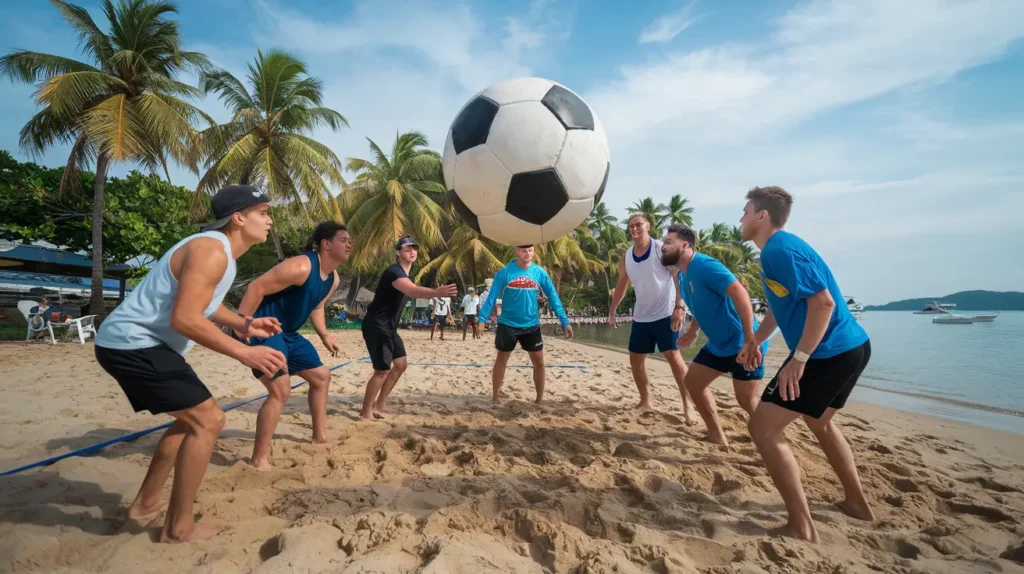
1. Cultural Exchange
- Local Interaction: Playing sports with locals provides authentic insights into their culture and traditions.
- Unique Experiences: Learn new sports or local variations, such as sepak takraw in Southeast Asia or Gaelic football in Ireland.
2. Personal Growth
- Skill Enhancement: Improve your techniques and tactics by playing with diverse opponents.
- Resilience: Travel challenges, such as adapting to new environments, boost your mental strength.
3. Health and Fitness
- Staying Active: Sports keep you physically engaged during your travels.
- Mental Wellness: Combines the stress-relief benefits of travel with the endorphin boost from exercise.
4. Building Connections
- Team Spirit: Join local or international teams and build lasting friendships.
- Networking Opportunities: Sports often open doors to connections across borders.
Playing a Sport for Travel: Popular Sports for Travel

1. Soccer (Football)
- Global Appeal: Soccer is played virtually everywhere, making it easy to join local games.
- Opportunities: Participate in amateur tournaments, club tryouts, or friendly matches while traveling.
2. Surfing
- Top Destinations: Explore surfing hotspots like Hawaii, Bali, or Australia.
- Camps and Lessons: Enroll in surf schools to improve your skills while enjoying scenic beaches.
3. Tennis
- International Tournaments: Compete in amateur or open tournaments held globally.
- Facilities: Many resorts and sports clubs offer top-notch courts and coaching.
4. Golf
- Prestigious Courses: Play on world-class courses in destinations like Scotland, Florida, or Dubai.
- Networking: Golf trips often combine business networking with travel.
5. Running and Marathons
- Scenic Routes: Participate in marathons and fun runs in iconic locations, such as the Boston Marathon or the Great Wall Marathon.
- Local Insight: Running events often provide unique perspectives of a destination.
6. Skiing and Snowboarding
- Alpine Adventures: Travel to the Alps, Rockies, or Japan for exhilarating snow sports.
- Seasonal Excitement: Explore different terrains and snow conditions across the globe.
7. Yoga and Martial Arts
- Wellness Retreats: Join yoga retreats in serene locations like India or Thailand.
- Martial Arts Training: Travel to Brazil for jiu-jitsu or Japan for karate and judo training camps.
Playing a Sport for Travel: How to Plan a Trip Around Playing a Sport
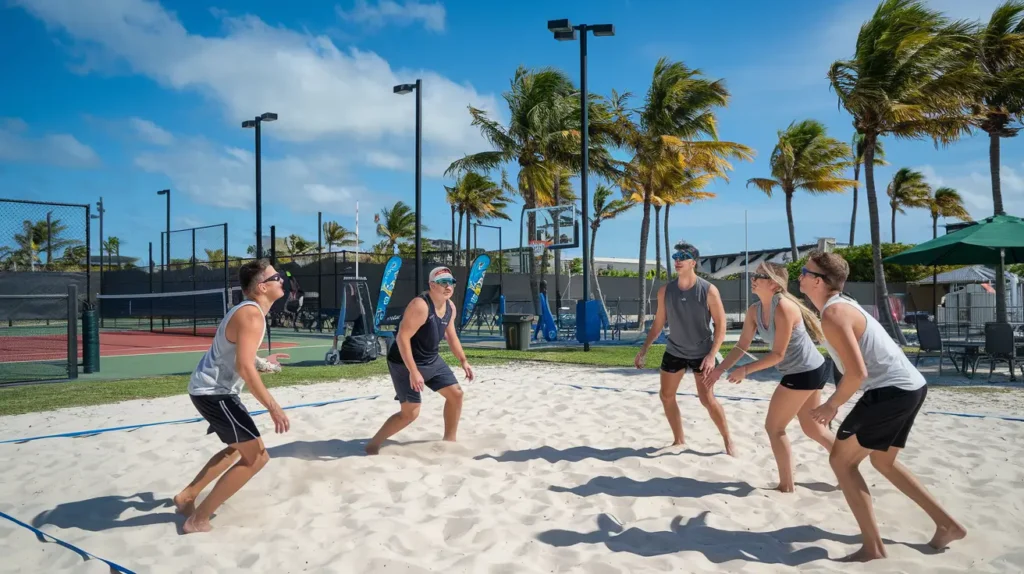
1. Research and Choose the Right Destination
- Sport-Specific Locations: Look for destinations renowned for your chosen sport.
- Seasonal Factors: Consider weather and availability of facilities for outdoor sports.
2. Find Local Events and Communities
- Join online forums or social media groups related to your sport.
- Look for clubs, leagues, or pickup games at your destination.
3. Book Accommodation with Sports Facilities
- Opt for hotels or resorts offering specialized amenities like tennis courts, gyms, or surf rentals.
4. Pack the Right Gear
- Bring essential equipment for your sport, considering airline luggage policies.
- Rent equipment locally if transporting gear is impractical.
5. Stay Safe and Healthy
- Adapt to local climates to avoid injuries or heat exhaustion.
- Ensure you have travel insurance that covers sports-related activities.
Combining Sports and Travel: Success Stories
Traveling Teams and Leagues
Many amateur and semi-professional teams organize tours to compete internationally, combining sports with sightseeing.
Adventure Sports Travelers
Enthusiasts of rock climbing, paragliding, or scuba diving often plan trips around these activities, exploring top adventure destinations worldwide.
Fitness Enthusiasts Abroad
Fitness travelers attend international boot camps, yoga retreats, or marathon events to stay active while exploring new cultures.
Playing a Sport for Travel: Challenges of Playing a Sport for Travel
1. Logistical Challenges
- Scheduling games or tournaments around travel plans can be complex.
- Transporting sports gear internationally requires careful planning.
2. Physical and Environmental Adaptation
- Playing at high altitudes or in unfamiliar climates may affect performance.
- Jet lag and fatigue from travel can impact your energy levels.
3. Financial Considerations
- Participating in sports events or training camps abroad can be costly.
- Budgeting for equipment rentals, registration fees, and travel expenses is essential.
Playing a Sport for Travel: Tips for Playing a Sport While Traveling
1. Stay Open to New Experiences
Try unfamiliar sports popular in your destination.
Embrace cultural differences in rules and playing styles.
2. Balance Sports and Exploration
Dedicate time for sightseeing and relaxation to make the most of your trip.
Avoid overcommitting to games or training that might detract from your travel experience.
3. Prepare in Advance
Train regularly before your trip to stay in shape.
Familiarize yourself with local rules or playing conditions.
Playing a Sport for Travel: The Future of Playing a Sport for Travel
Rising Popularity of Sports Tourism
As more people combine travel with sports, the demand for sports-centric travel packages is increasing.
Technological Advances
- Apps and platforms now connect travelers with local sports events and communities.
- Virtual training programs help athletes prepare for travel-based competitions.
Sustainability in Sports Travel
Eco-friendly initiatives are emerging, encouraging travelers to support local communities and minimize environmental impact during sports trips.

How Playing a Sport Enhances Travel Experiences
Playing a sport while traveling is more than just a recreational activity. It serves as a bridge that connects people, overcomes language barriers, and creates meaningful memories. Here’s how it can elevate your travel experience:
1. Immersing in Local Cultures
- Learning Traditions Through Sports: Every region has unique sports that reflect its cultural heritage. For instance, playing cricket in India or rugby in New Zealand introduces you to local customs and practices.
- Building Cross-Cultural Relationships: Sharing a game or a training session with locals helps foster understanding and mutual respect.
2. Gaining a Deeper Connection with Your Destination
- Exploring Beyond the Tourist Spots: Participating in local sports takes you off the beaten path, offering insights into daily life in the community.
- Memorable Stories: You may leave with tales of camaraderie, teamwork, or even friendly rivalries that resonate long after your trip ends.
3. Encouraging Mindful Travel
- Engagement Over Consumption: Instead of passively observing, playing a sport actively engages you with the destination.
- Focus on Well-Being: Combines the physical benefits of sports with the mental rejuvenation of travel.
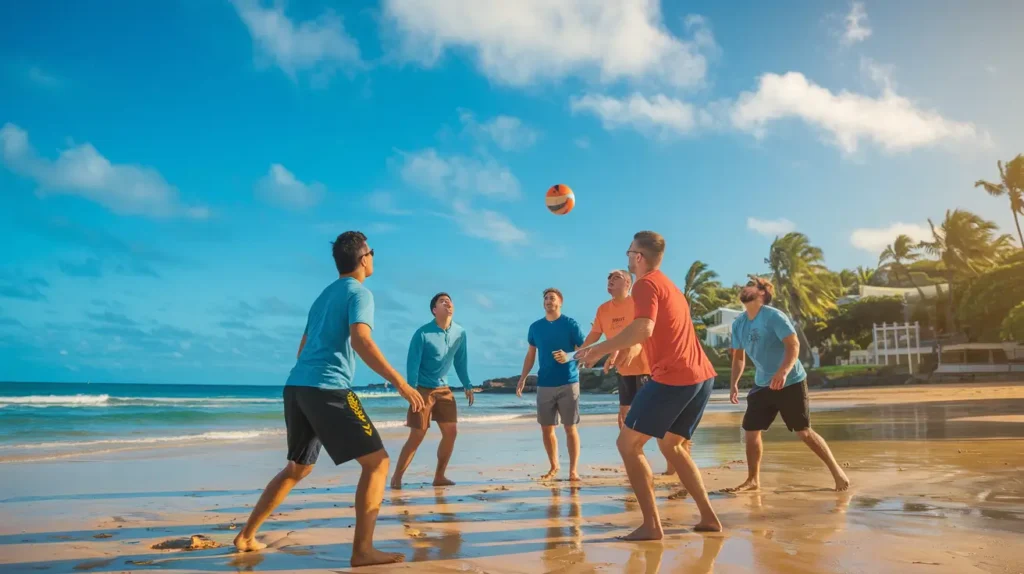
Also Read: How to Travel Europe for 2 Weeks?
Playing a Sport for Travel: Sports You Can Play Anywhere While Traveling
Some sports are versatile and easy to integrate into travel plans, requiring minimal equipment and setup.
1. Running
- Universal Appeal: Lace up your sneakers and hit the road in any city or countryside.
- Scenic Routes: Running through urban landmarks or natural trails offers a unique perspective on your surroundings.
2. Beach Volleyball
- Coastal Favorites: Many beach destinations host casual volleyball games that welcome travelers to join.
- Social Aspect: A great way to meet fellow travelers and locals.
3. Cycling
- Bike Rentals: Easily accessible in most tourist destinations.
- Exploration on Wheels: Cycling tours allow you to cover large areas while staying active.
4. Swimming
- Natural and Artificial Options: From pristine beaches to hotel pools, swimming is widely available.
- Health Benefits: A full-body workout that’s refreshing and relaxing.
5. Table Tennis and Badminton
- Indoor and Outdoor Options: Found in parks, community centers, and resorts.
- Compact Gear: Easy to pack rackets and shuttlecocks or find local equipment.
Playing a Sport for Travel: The Rise of Adventure Sports Tourism
For thrill-seekers, combining travel with adventure sports has opened up new possibilities for exploration. These high-adrenaline activities not only satisfy your craving for excitement but also immerse you in the natural beauty of a destination.
Popular Adventure Sports for Travelers
Bungee Jumping: Dive from great heights in places like Queenstown, New Zealand, or Macau Tower in China.
Scuba Diving: Explore underwater wonders in the Maldives, the Great Barrier Reef, or the Red Sea.
Rock Climbing: Test your skills on world-famous cliffs in Yosemite, Kalymnos (Greece), or Railay Beach (Thailand).
Paragliding: Soar above stunning landscapes in Switzerland, Nepal, or Brazil.
Playing a Sport for Travel: Incorporating Sports Travel into Family Vacations
Playing a sport for travel isn’t just for solo adventurers or professional athletes. Families can also benefit from incorporating sports into their travel plans:
1. Activities for All Ages
- Kid-Friendly Sports: Activities like mini-golf, swimming, and cycling are enjoyable for children.
- Intergenerational Fun: Parents and kids can bond over friendly games of tennis, soccer, or frisbee.
2. Encouraging Healthy Habits
- Active Lifestyles: Sports-based vacations teach children the importance of fitness and staying active.
- Teamwork and Cooperation: Playing together fosters teamwork and strengthens family relationships.
3. Memorable Experiences
- Participating in Local Events: Joining a fun run or sports festival makes for a memorable family outing.
- Learning Together: Families can take lessons in new sports like surfing or skiing, creating lasting memories.
Playing a Sport for Travel: Sports Training Camps and Retreats
Sports-focused travel often includes opportunities to enhance your skills or immerse yourself in a sport through dedicated training programs.
Benefits of Training Camps
- Expert Coaching: Learn from professional trainers who can fine-tune your technique.
- Intensive Learning: Dedicated schedules help you focus entirely on skill development.
- Networking: Meet like-minded individuals who share your passion for the sport.
Popular Training Retreats
- Yoga in India: Practice yoga in its birthplace at retreats in Rishikesh or Goa.
- Soccer Camps in Europe: Train with renowned academies in Spain, Italy, or the UK.
- Tennis in the Caribbean: Play on scenic courts with world-class coaches.
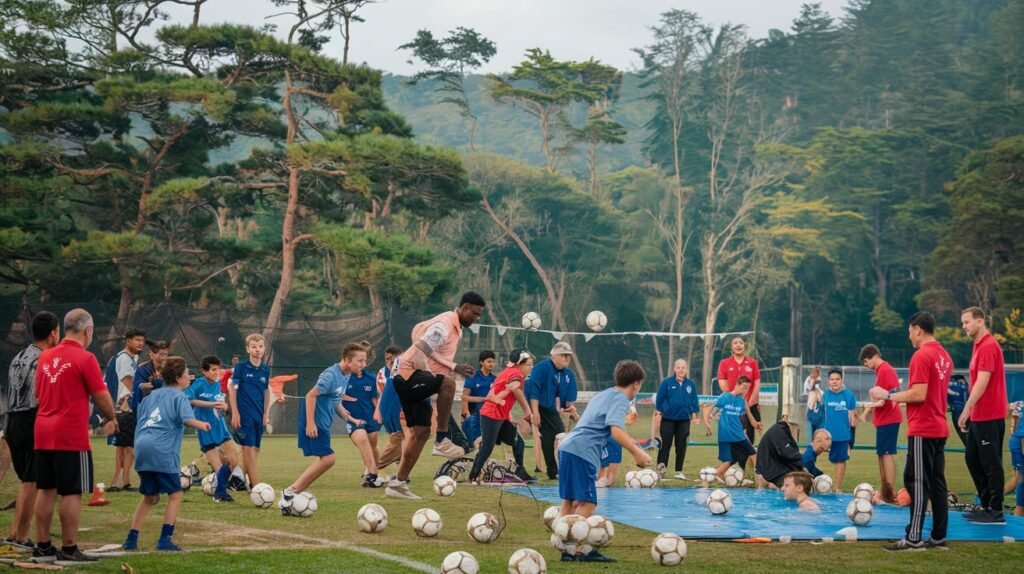
Sports and Eco-Tourism: A Sustainable Approach
Playing a sport for travel can also contribute to sustainable tourism by supporting local economies and minimizing environmental impact.
Eco-Friendly Sports Activities
- Kayaking and Paddleboarding: Explore rivers, lakes, and coastlines without harming the environment.
- Hiking and Trail Running: Enjoy nature responsibly by staying on marked paths and minimizing waste.
Supporting Local Communities
- Participating in local sports events helps fund community programs.
- Hiring local guides and using regional facilities contribute to the local economy.
What Are Travel Sports?
Travel sports refer to competitive sports leagues or teams that require athletes to travel outside their local area to compete. These teams usually play against other teams from different cities, states, or regions. Travel sports are often organized for youth athletes, including basketball, soccer, baseball, and more. The focus is on competition, skill development, and team camaraderie, rather than just recreational play.
What Age Should You Start Travel Sports?
The age at which you should start travel sports can vary depending on the sport and the individual child’s development. Many travel sports teams start accepting players as young as 8 to 10 years old. However, some leagues have age-specific divisions for players as young as 5 or 6. The decision to start travel sports should depend on the child’s physical ability, interest in competition, and family’s ability to commit time and resources.
What Are the Pros and Cons of Travel Sports?
Pros of Travel Sports:
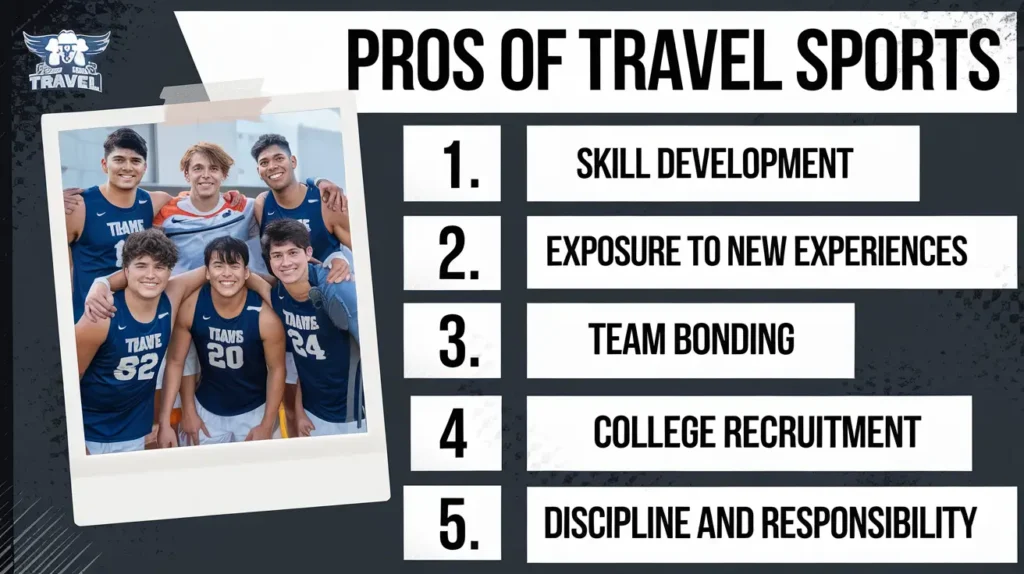
- Skill Development: Travel sports provide an opportunity for athletes to compete at higher levels, improving their skills through competition against stronger opponents.
- Exposure to New Experiences: Traveling exposes players to different cultures, cities, and experiences, helping them grow as individuals.
- Team Bonding: Travel teams often build a strong sense of camaraderie, as players and coaches spend a lot of time together on the road.
- College Recruitment: For some athletes, travel sports offer exposure to college scouts and recruiters, especially in high school.
- Discipline and Responsibility: The commitment required for travel sports helps athletes develop responsibility, discipline, and time management skills.
Cons of Travel Sports:

- Cost: Travel sports can be expensive due to registration fees, uniforms, travel, and accommodation costs. This can make it inaccessible for some families.
- Time Commitment: Travel sports often require weekends, vacations, and long hours, which can interfere with family time, schoolwork, and other activities.
- Stress on Family Life: Constant travel and the associated stress can put a strain on family relationships, with parents needing to coordinate schedules, logistics, and finances.
- Physical and Emotional Burnout: The intense competition and constant travel can lead to burnout for both players and parents.
- Injury Risk: Playing in higher-level competitions increases the likelihood of injury due to the intensity of the games and the physical demands.
Are Travel Sports Worth It?
Whether travel sports are worth it depends on the individual family’s goals, values, and resources. If your child is serious about sports and has the ability and desire to compete at a higher level, travel sports may be a good investment in terms of skill development and exposure. However, if the family struggles with the time commitment, financial strain, or the stress of constant travel, it might not be worth it.
How Much Do Travel Sports Cost?
The cost of travel sports varies widely depending on the sport, team, location, and level of competition. On average, parents may spend between $1,000 to $10,000 or more per year on travel sports, including:
Registration Fees: $100 to $1,000+ per season
Uniforms and Gear: $100 to $500
Travel Expenses: Gas, hotels, food, and flights can add up, sometimes costing thousands of dollars per year.
Coaching Fees: Some teams require additional payments for coaching or special training sessions.
Costs can add up quickly, especially for families with multiple children involved in travel sports.
Is a Travel Ball Worth It?
“Travel ball” refers to youth sports teams that play in tournaments across regions or even nationally. Whether it’s worth it depends on the level of commitment your child has to the sport, your family’s budget, and how much you value the experiences of competition and travel. If your child is passionate about the sport and you can afford the costs, travel ball can provide valuable experiences. However, it’s essential to weigh the benefits against the financial, time, and emotional costs.
Why Are Travel Sports Bad?
There are several arguments against travel sports:
- Financial Burden: The high costs associated with travel sports can be a strain on family finances, often excluding those who can’t afford it.
- Too Much Pressure on Kids: The emphasis on competition can lead to excessive pressure on young athletes, potentially leading to burnout or loss of enjoyment in the sport.
- Reduced Family Time: The time commitment required for travel sports often means missing out on other family activities, holidays, and important events.
- Physical Strain and Injuries: Playing more games at a higher level increases the risk of injuries, particularly overuse injuries that can impact a child’s long-term health.
- Negative Impact on Mental Health: The constant travel, pressure to perform, and competition can take a toll on children’s mental well-being.
Travel Sports vs. School Sports
Travel Sports: Travel sports are competitive and often require a significant time and financial commitment. They are typically focused on athletes who want to compete at a higher level, and they provide exposure to college recruiters and more competitive experiences. However, they can come with a cost and time commitment that school sports do not.
School Sports: School sports are often less competitive than travel sports but provide a balance between athletic development and academic life. They are generally more accessible and less expensive than travel sports, though they may not offer the same level of exposure to college scouts. They also allow for greater balance with social and academic responsibilities.
What Is Travel Basketball?
Travel basketball is a highly competitive, club-level basketball league that requires players to travel outside their local area to compete against other teams in tournaments and games. It usually starts at a younger age and can extend through high school, often providing opportunities for college recruitment. Travel basketball involves higher commitment, both financially and time-wise, but offers higher-level competition than recreational or school basketball leagues.
Youth Sports and Travel Sports
Youth sports refer to sports played by children, typically in a recreational or developmental setting. Travel sports are a subset of youth sports that focus on more competitive play, often requiring travel to tournaments and games outside the local area. Youth sports provide an opportunity for kids to stay active and develop physical skills, while travel sports offer a more intense, competitive experience.
Travel Sports Ruined My Marriage
For some families, the demands of travel sports can strain relationships. The constant travel, financial stress, and time commitment can lead to disagreements between parents or between parents and children. Balancing family life with the schedule of a travel sports team can be difficult, and in some cases, it has led to emotional strain or even divorce. It’s important for families to discuss and manage expectations and communicate openly about the challenges that come with travel sports.
Playing a Sport for Travel: Playing a Sport for Travel Insurance and Cost
Some families consider travel insurance when signing up for travel sports to help mitigate costs related to medical expenses, travel delays, or cancellations due to injuries. However, travel sports fees typically don’t include travel insurance, so parents might need to buy it separately. Additionally, considering the cost of travel, accommodations, and other expenses, parents should weigh whether the benefits of travel sports justify the financial burden.
Conclusion: Playing a Sport for Travel
Playing a sport for travel offers a unique way to explore the world while staying active, building connections, and immersing yourself in new cultures. Whether you’re pursuing competitive glory, honing your skills, or simply enjoying a game for fun, sports can transform your travel experience.
With proper planning, an open mind, and a passion for your chosen sport, you can create unforgettable memories and enrich your journey through the synergy of athletics and adventure.
FAQs: Playing a Sport for Travel
1. What does playing a sport for travel mean?
Playing a sport for travel refers to engaging in sports activities or competitions as a way to explore new destinations. This can involve participating in local games, attending training camps, or competing in tournaments while traveling.
2. Who can participate in playing a sport for travel?
Anyone can participate, including:
- Professional Athletes: Traveling for competitions or specialized training.
- Amateur Enthusiasts: Joining recreational games or leagues.
- Families and Travelers: Incorporating sports into vacation plans.
3. What are the benefits of playing a sport while traveling?
- Cultural Exchange: Meet locals and learn about their traditions.
- Health and Fitness: Stay active during your trip.
- Unique Experiences: Discover sports or activities specific to the region.
- Networking: Build connections with people who share your passion.
4. What sports are popular for travel?
Some of the most popular sports for travel include:
- Soccer (Football)
- Surfing
- Tennis
- Golf
- Running (e.g., marathons)
- Skiing and Snowboarding
- Yoga and Martial Arts
5. How can I find opportunities to play sports while traveling?
- Local Sports Clubs: Search for clubs or recreational leagues in your destination.
- Tourism Platforms: Look for sports-specific tours or experiences.
- Online Communities: Use forums and social media to connect with local players or teams.
6. Do I need special permits or permissions to play sports abroad?
In most cases, no special permits are needed for casual or recreational sports. However, if you’re participating in organized competitions, you may need to register or obtain specific documentation, especially for professional-level events.
7. What should I pack for a sports-focused trip?
- Essential gear for your chosen sport (e.g., shoes, rackets, swimwear).
- Travel-friendly clothing suitable for physical activity.
- Any required safety equipment, like helmets or pads.
- A lightweight first-aid kit for minor injuries.
8. Are there challenges associated with playing a sport for travel?
- Adapting to the Environment: Different climates or altitudes may impact your performance.
- Logistics: Transporting sports gear can be difficult, especially for bulky items.
- Costs: Training camps, equipment rentals, and competition fees can add to travel expenses.
9. Can families include sports in their travel plans?
Yes, many sports are family-friendly, such as swimming, cycling, or hiking. Families can also participate in sports festivals, fun runs, or take lessons together in activities like skiing or surfing.
10. What are the best destinations for sports-based travel?
- Soccer Fans: England, Spain, or Brazil for local games and leagues.
- Surfing: Hawaii, Bali, or Australia for top-notch waves.
- Skiing: The Alps, Rockies, or Japan for winter sports.
- Yoga Retreats: India or Thailand for serene and immersive experiences.
11. Can playing sports while traveling be eco-friendly?
Yes! Many sports, like hiking, kayaking, or cycling, align with sustainable travel practices. Opt for locally run facilities, respect nature, and minimize waste during your activities.
12. Why is playing a sport for travel becoming popular?
Sports travel is gaining popularity because it offers a unique way to combine fitness, adventure, and cultural exploration. It appeals to people seeking active, meaningful, and enriching travel experiences.
13. Is it expensive to combine sports with travel?
It depends on the sport and the level of engagement. Recreational activities like running or hiking are cost-effective, while professional training camps or tournaments may require significant investment.
14. How can I ensure safety while playing sports during travel?
- Use appropriate gear and equipment.
- Stay hydrated, especially in unfamiliar climates.
- Warm up before activities and cool down afterward.
- Have travel insurance that covers sports-related incidents.
15. Can I learn a new sport while traveling?
Absolutely! Many destinations offer beginner-friendly lessons or camps for sports like surfing, martial arts, or skiing. It’s a fun way to immerse yourself in the local culture and try something new.

